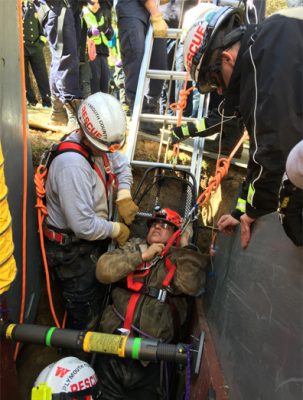Get the help you need right now 855-900-8437 Get Help Now
Get the help you need right now 855-900-8437 Get Help Now
October 3, 2018
Workplace injuries are a basic fact of life for many fire fighters and paramedics. In 2016 alone, 62,085 fire fighter injuries were reported by the National Fire Protection Association (NFPA). While personal protective equipment (PPE) can help safeguard you from fire, it can’t protect you from strains, sprains and other muscle injuries. If you’re coping with pain management issues as a result of your injury, you may be prescribed powerful, pain-killing medications (opioids).
While some fire fighters can successfully recover from injuries with or without medication, others develop a far more serious condition — opioid addiction. While opioids relieve pain in the short term, some will quickly develop physiological dependence, even when using medication responsibly and according to the prescribed regimen. That’s why it’s crucial for fire fighters and the people who love them to understand the signs and symptoms of opioid addiction, and to reach out for to professional help when necessary.
Developing an opioid dependence following a debilitating injury isn’t a problem restricted to fire fighters. Unfortunately, people of all demographics and occupations across the United States struggle with this problem. This widespread nature of opioid addiction illustrates the insidious nature of opioid addiction.
This is because of the way opioids work on the brain and body. Once ingested, opioids mimic endorphins, or feel-good neurotransmitters. As opioid use continues over time, the body stops creating these endorphins on its own. Once you reach this point, your body becomes dependent on opioids to function properly. Without them, you descend into physical and psychological withdrawal symptoms, such as anxiety, restlessness, insomnia, nausea, vomiting and diarrhea.
The first step to prevent opioid addiction is to talk to your doctor honestly about the risks and benefits of these medications for pain management. If you understand the addictive potential of the medications you’re taking and know some common signs of addiction to watch for, you can recognize any potential problems before they progress into a full-blown substance use disorder.
Some of the most commonly prescribed opioid medications include:
Because the signs of addiction can be subtle, it’s important to be mindful of the way opioid medications affect you or someone you love. If you notice any of the following signs of addiction, reach out to your medical provider and stop taking your medication as soon as possible:
It can be difficult to tell when it’s time to seek professional treatment for opioid addiction, especially if you’re recovering from an injury. You might tell yourself that because you’re not fully healed, you still need your medication. However, if you’re exhibiting any of the above signs of a substance use disorder, it’s important that you seek help sooner rather than later. Early intervention can result in a smoother detoxification and recovery process. If you’ve struggled with opioid addiction for an extended period, professional treatment can connect you to the medical and clinical care you need to manage the cycle of addiction.

It’s never too late to get the help you need. If you or an IAFF member you know struggles with opioid addiction, the IAFF Center of Excellence can provide you with the treatment and tools you need to begin the recovery process. As a facility designed by fire fighters, for fire fighters, professionals at the IAFF Center of Excellence understand the unique challenges that come with being a fire fighter or paramedic. If you’re ready to take the first step toward a better life, or want to learn more about our treatment options, reach out to a representative today. Your call is toll-free and confidential.
Medical Disclaimer: The IAFF Center of Excellence aims to improve the quality of life for people struggling with a substance use or mental health disorder with fact-based content about the nature of behavioral health conditions, treatment options and their related outcomes. We publish material that is researched, cited, edited and reviewed by licensed medical professionals. The information we provide is not intended to be a substitute for professional medical advice, diagnosis or treatment. It should not be used in place of the advice of your physician or other qualified healthcare provider.